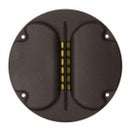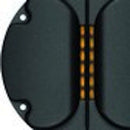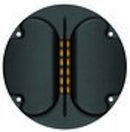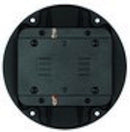Description
| General Data | |
| Nominal Power Handling (Pnom)(W) | 15 |
| Max Power Handling (Pmax)(W) | 30 |
| Sensitivity (2.83v/1m)(dB) | 94 |
| Weight (M)(Kg) | 0.2 |
| Electrical Data | |
| Nominal Impedance (Z)(Ω) | 5 |
| Voice Coil and Magnet Parameters | |
| Magnet Former | Neodymium |
Why do we call the RT1C-A Isodynamic?
Contrary to a conventional electrodynamic driver, this transducer has a driving force distributed evenly over the whole area of the vibrating element.
What is special about the RT1C-A?
The key element of the RT1C-A is the membrane, which consists of Kapton? Film with a pattern of Aluminum conductors. The conductors cover about 90% of the whole vibrating area. The membrane assembly is placed precisely between two rows of Neodymium bar magnets. An Aluminum mounting flange, with flared wave-guide, controls the frequency response and directivity of the tweeter. The clamped membrane area is connected to the front metal plate. This, combined with a special heat conductive compound, provides effective cooling of the aluminum conductors. This tweeter is magnetically shielded and is an extremely flat driver. Its depth is only 18 mm including the mounting flange.
The RT1C-A has resistive impedance in the audio frequency range. This unique feature provides a friendly load for any amplifier and facilitates easy crossover design. Unlike other drivers, the RT1C-A has an essentially linear phase response that provides time coherent reproduction resulting in accurate musical rhythm and imaging. The vibrating element of the RT1C-A is almost weightless compared to that of a dome tweeter. As a result it provides an immediate and precise response to any transients in the original signal. The RT1C-A has an exceptional ability to reveal the dynamics of instruments with complex high frequency spectra.
Unlike conventional tweeters and electrostatic speakers, the RT1C-A has an extremely wide sound dispersion in the horizontal plane. The radiating area of the tweeter is 50 x 13 mm, where 13 mm defines the horizontal dimension. At the same time, contrary to other dynamic tweeters, the RT1C-A has well-controlled dispersion in the vertical plane. This feature helps to avoid disturbing floor and ceiling reflections, increasing imaging accuracy. With this tweeter there is no need to manipulate the network or use multiple units to achieve the restricted vertical directivity necessary for home theater applications.
When considering all of the properties of the RT1C-A, it becomes clear why many critical listeners among audiophiles highly prize planar transducers. They possess unsurpassed clarity, transparency and the ability to deliver every tiniest musical detail.
Since the RT1C-A has exceptional ability to reveal the dynamics of instruments and sonic resolution, it is recommended to match it with drivers having similar properties in order to maximize the overall integrity of a speaker system.

|
|
|||||||||||
Payment & Security
Your payment information is processed securely. We do not store credit card details nor have access to your credit card information.







